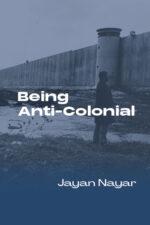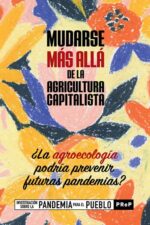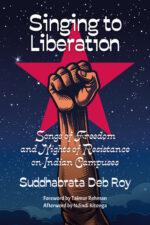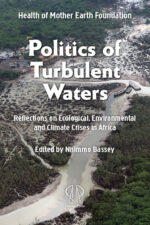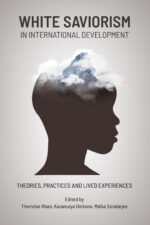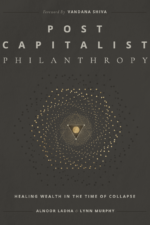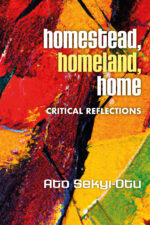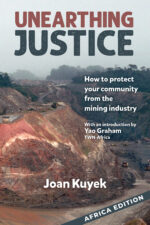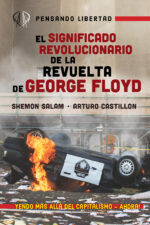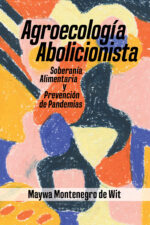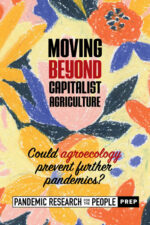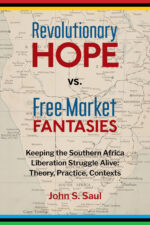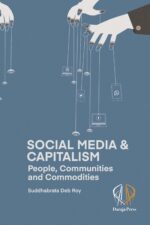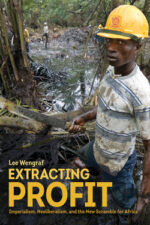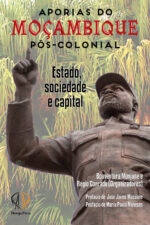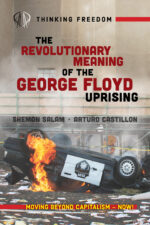-
Mudarse Màs Allá de la Agricultura Capitalista
El COVID-19 es una enfermedad neoliberal y la agroecología que libera a la tierra y a la gente de la codicia y hacia la soberanía alimentaria es el camino para salir de este desastre.
– Saulo Araujo, Amigos del Movimiento de los Sin Tierra de Estados UnidosSi quieres saber más sobre las conexiones entre el capitalismo racial, la agricultura industrial, la destrucción ambiental y las epidemias y pandemias, este es un excelente lugar para empezar.
– Arturo Castillon, coautor, El significado revolucionario dellevantamiento de George FloydEsta publicación defiende firmemente la agroecología como parte crucial de un futuro que pone a las personas por encima de las ganancias; un futuro que asegura la salud de las personas permitiendo el florecimiento de la salud planetaria. Aportará claridad a todos los que traten de entender cómo se puede evitar la próxima pandemia al tiempo que se construye un mundo más justo.
– Vijoleta Gordeljević, Economista de la salud y experta en política sanitaria medioambiental, People’s Health MovementLos agentes patógenos surgen una y otra vez de un sistema agroalimentario global arraigado en la desigualdad, la explotación laboral y el extractivismo sin límites por el que se despoja a las comunidades de sus recursos naturales y sociales. Un sistema económico propenso a la crisis que prioriza la producción para obtener beneficios por encima de la satisfacción de las necesidades humanas y la preservación ecológica se organiza en torno a una intensa producción monocultural que, por el camino, permite la aparición de las enfermedades más mortíferas.
La Investigación sobre la Pandemia para el Pueblo (PReP) se centra en cómo la agricultura podría ser reimaginada por el tipo de intervención a nivel de la comunidad que podría detener la aparición del coronavirus y otros patógenos en primer lugar. Abordamos cómo la ciencia convencional apoya los mismos sistemas políticos y económicos que ayudaron a producir la aparición del coronavirus y otros patógenos en primer lugar.
Introducimos la agroecología, un ecologismo de los campesinos, los pobres y los indígenas, que existe desde hace mucho tiempo, y que trata la agricultura como una parte de la ecología de la que la humanidad cultiva sus alimentos. La agroecología -una ciencia, un movimiento y práctica- combina la ciencia ecológica, los conocimientos indígenas y campesinos y los movimientos sociales por la soberanía alimentaria y territorial para lograr sistemas alimentarios ambientalmente justos.
-
Post Capitalist Philanthropy
In Post Capitalist Philanthropy, Ladha and Murphy walk us through the deep logic of neoliberalism, the foundations of globalisation and the ideology of corporate free trade… [they] dissect philanthrocapitalism, and they indicate the possibilities of reclaiming the true, economics of the gift, of caring and sharing.— Vandana Shiva, from the Foreword to Post Capitalist Philanthropy.
Ladha and Murphy conduct a “sweeping and engaging ethnography of the archetypal, mythopoetic, institutional, and philosophical territories of capital as a worlding agent and as a carceral dynamic obscuring transformational possibilities…We would need to move and think with our feet again, experimenting beyond money as a paradigm of control. We’ve already begun. ~ Bayo Akomolafe ~ Author, These Wilds Beyond our Fences: Letters to My Daughter on Humanity’s Search for Home and founder of The Emergence Network
This book asks a daring question: can wealth be reappropriated to restore balance to our broken world? A key resource for anyone eager to rethink philanthropy and“ economics in the 21st century. ~ Jason Hickel ~ Visiting Senior Fellow at the London School of Economics, author of The Divide and Less is More
Each page contained in this text“is a reminder of what my heart already knows is true, with information and inspiration that lifts the sense of possibility for making deep change together.
~ Gail Bradbrook ~ Co-founder, Extinction RebellionPost Capitalist Philanthropy is an essential mystical revolutionary handbook that should be required reading for anyone involved in philanthropy.
V (formerly Eve Ensler) —Author of The Vagina Monologues***
Transition Resource Circle thanks Daraja Press, the non-profit Pan-African publisher focused on social justice, for their collaboration in making this book a reality. All proceeds from the book are evenly split between Daraja Press and Transition Resource Circle’s solidarity fund.
-
Episodes from a colonial present
Postcolonial critique deconstructs global inequality in its epistemic and material dimensions. This collective comic project illuminates everyday life’s coloniality as well as the decolonising potential of everyday struggles in the spaces, discourses and practices of so-called ‘global development’. -
El Significado Revolucionario de la Revuelta de George Floyd
Si quieres poner la rebelión de George Floyd en su contexto político e histórico adecuado, esta es una de las obras con las que debes empezar. El Significado Revolucionario de la Revuelta de George Floyd plantea el caso incuestionable de que lo que presenciamos no fue solo una serie de eventos con el objetivo de reformar el imperio, como los medios burgueses quieren hacernos creer, sino un movimiento que en su corazón tenía y tiene como objetivo la erradicación del imperio y la construcción de un futuro nuevo e incierto. Este trabajo explica por qué y, además, aborda cómo puedes participar más profundamente.
– Kali Akuno, cofundador de Cooperation Jackson
Hablando sobre la descolonización, Fanon dice que cuando tratamos de cambiar el orden del mundo, esto es “claramente una agenda para el desorden total.” Con esto quiere decir que es una demanda absoluta, que no puede ser mediada por modificaciones de política. Esta demanda absoluta regresa en las llamas del Tercer Recinto en Minneapolis, en el verano de 2020. Nadie se ha acercado más que Shemon y Arturo en capturar esta lucha, en nombrar el carácter extraordinario y contradictorio de la Revuelta de George Floyd—cómo escapa la misma historia que la produce, única e inevitable, una verdadera insurgencia, progenitora de un centenar de formaciones contrainsurgentes. Estos comunicados de la rebelión ofrecen claridad sobre las desesperadas y extraordinarias victorias de la lucha y las formas que tomará el enemigo. Este texto es portador de las posibilidades, propuestas y problemas del verano; No puedo imaginar un mejor destino para la escritura.
– Joshua Clover, autor de Riot.Strike.Riot: The New Era of Uprisings
No hubo nada más que oscuridad en la primavera de 2020 cuando la pandemia de Covid-19 se enfureció y cerró la economía. Pero mientras que los manifestantes de derecha exigieron el fin del cierre de emergencia, un conflicto mucho más grande se estaba gestando bajo la superficie. Una rebelión exploto en Minneapolis en respuesta al asesinato policial de George Floyd, y durante la rebelion una estación de policía fue tomada y prendido fuego. Después de esto la revuelta se extendió rápidamente por todo los Estados Unidos. Los manifestantes saquearon los centros urbanos, lucharon contra la policía, quemaron coches de policía y destruyeron edificios de gobierno. El proletario negro lideró la carga, pero los proletarios blancos, latinos, asiáticos e indígenas también se unieron a la lucha, demostrando nuevas posibilidades para construir alianzas en esta sociedad segregada. Si bien las rebeliones contra la policía continuaron durante el verano y el otoño, el levantamiento retrocedió con el comienzo del invierno. Pero este conflicto está lejos de terminar.
Preparándonos para las grandes luchas que vienen, El Significado Revolucionario de la Revuelta de George Floyd proporciona un análisis de lo que sucedió durante los disturbios de 2020 en los Estados Unidos, sus potenciales, límites internos, e implicaciones estratégicas.
Esta es una traducción al español de The Revolutionary Meaning of the George Floyd Uprising
-
Agroecología Abolicionista, Soberanía Alimentaria y Prevención de Pandemias
Un sistema alimentario agroecológico no consiste más acerca de alimentos orgánicos que la abolición se refiere a abrir la puerta de una prisión. En este ensayo vital, Maywa Montenegro de Wit entrelaza ideas provenientes de las literaturas políticas y ecológicas más importantes de finales del siglo XX y comienzos del XXI. La pandemia proporciona un foco para estas dos fuentes de iluminación, pero la luz brillante que proviene de unir estas disciplinas brillará mucho después de que pase la sombra de la Covid-19. —Raj Patel, autor de Stuffed and Starved [Relleno y famélico].
El folleto resuena con la pregunta: ¿reforma o transformación? Pregunta: ¿mitigaremos y adaptaremos o revisaremos y cambiaremos nuestros imaginarios? Se nos ha dado un andamio para abordar el bastión del colonialismo y la colonialidad y para reconstruir los sistemas que ya han empujado su rodilla sobre los sistemas alimentarios y socioeconómicos que ya se estaban sofocando. Es hora de librarse de una pesadilla construida deliberadamente. – Nnimmo Bassey, autor de To Cook a Continent: Destructive Extraction and the Climate Crisis in Africa [El cocinar un Continente: Extracción Destructiva y Crisis Climática en África] y fundador de Health of Mother Earth Foundation [Fundación Salud de la Madre Tierra].
La COVID-19 y otros brotes zoonóticos como el ébola son ilustrativos de las complejas interacciones entre la deforestación, la pérdida de biodiversidad, la destrucción del ecosistema y la salud y seguridad humanas. Estos cambios son impulsados principalmente por la agricultura industrial y el sistema alimentario globalizados, respaldados por el ilógico y destructivo capitalismo racial. … Montenegro de Wit presenta argumentos convincentes a favor de cambios hacia sistemas agroecológicos diversificados que reconozcan las complejas interconexiones entre la salud humana y animal, entre las plantas y nuestro medio ambiente y futuro compartidos. De hecho, abordar las pandemias de manera sistémica no puede desvincularse de la construcción de economías y sistemas alimentarios que se basan en las necesidades de las personas, en particular de los pequeños agricultores, y de los ecosistemas prósperos. Para lograrlo, debemos rechazar y prohibir rotundamente la ecocida ilógica de la mercantilización, la financialización y el extractivismo, como fuerzas impulsoras de las fortunas y los destinos humanos y ecológicos. … El fortalecimiento de los movimientos sociales a nivel local es indispensable para forzar la ruta de África hacia un liderazgo político eficaz y democrático. Se necesita una clara ruptura, dejando atrás intervenciones a favor de un desarrollo ahistórico y tecnicista, donde la tecnología y la productividad se plantean como problemas y soluciones, hacia un replanteamiento urgente y drástico para hacer frente a las crisis sistémicas convergentes que enfrentamos hoy.
– Mariam Mayet, directora ejecutiva del African Centre for Biodiversity [Centro Africano para la Biodiversidad]
COVID-19 ha expuesto la naturaleza racializada de los sistemas alimentarios, pero también potencialmente otorga oportunidades para construir de nuevo. Maywa Montenegro explora una serie de averías, desde cadenas de suministro fracturadas hasta infecciones incontroladas entre trabajadores de alimentos esenciales, entre comunidades negras, marrones e indígenas atravesadas por el virus a lo largo de viejos surcos de opresión racial y de clase.
Ella rastrea los orígenes probables de COVID-19 a los sitios de derrame forjados por la expansión agroindustrial en regiones boscosas donde los patógenos brotan libres e infectan a los humanos. La agricultura animal industrial impulsa estos cambios ecológicos que incuban futuros brotes. Las pandemias tienen sus raíces en la separación violenta de las comunidades de sus territorios, semillas, conocimiento y riqueza. El racismo permite tal robo como fundamental para la expansión capitalista.
Para hacer frente a las pandemias y las injusticias alimentarias, Montenegro pide una agroecología abolicionista. Ninguna alternativa anticapitalista puede ignorar el racismo que es central para el sistema alimentario transnacional. Académicos como Angela Davis, Ruth Wilson Gilmore y Mariame Kaba han argumentado que aunque la abolición se ve con frecuencia como una estrategia de oposición, para erradicar, por ejemplo, las prisiones y la policía, la abolición es igualmente proposicional. Una agroecología abolicionista abre múltiples posibilidades que responden a las exigencias de un planeta pandémico: no hay una “normalidad” a la que podamos regresar con seguridad.
Esta es una traducción al español de Abolitionist Agroecology, Food Sovereignty and Pandemic Prevention
-
Moving Beyond Capitalist Agriculture: Could Agroecology Prevent Further Pandemics?
Moving Beyond Capitalist Agriculture is born out of the coordination between scholars and community organizers and it should be shared widely. The group behind it, the Pandemic Research for the People, is an expression of collective wisdom and necessary unease. In fact, organization and solidarity are two values to be cherished in this moment of multiple crises. COVID-19 is a neoliberal disease and agroecology that frees the land and people of greed and towards food sovereignty is the pathway out of this mess. — Saulo Araujo, US Friends of the Landless Workers Movement
If you want to know more about the connections between racial capitalism, industrial agriculture, environmental destruction, and epidemics and pandemics, then this is a great place to start. But this pamphlet is more than just an analysis of the immense problems generated by capitalism. More importantly, this pamphlet represents an attempt to overcome this system and to develop revolutionary alternatives to it. Rather than falling into the tempting illusion of reform, the authors of these texts give invaluable insights into how we might support and develop revolutionary forms of agro-ecology that can sustain and reproduce life outside of the racial capitalist machine that is destroying it.” — Arturo Castillon, co-author, The Revolutionary Meaning of the George Floyd Uprising
Increasingly threatening climate disaster coinciding with a pandemic has tragically illustrated that the world doesn’t have the luxury of dealing with one crisis at a time – and capitalist agriculture is at the root of both. The authors show convincingly that there is a better way: one that’s based on self-determination and building on human cooperation, not competition. This publication makes a strong case for agroecology as a crucial part of a future that puts people above profit; a future that assures people`s health by allowing planetary health to flourish. It will bring clarity to everyone trying to understand how the next pandemic could be averted whilst building a more just world — Vijoleta Gordeljević, Health economist and environmental health policy expert, People’s Health Movement.
Pathogens repeatedly are emerging from a global agrifood system rooted in inequality, labor exploitation, and unfettered extractivism by which communities are robbed of their natural and social resources. A crisis-prone economic system that prioritizes production for profit over meeting human needs and ecological preservation is organized around intense monocultural production that, along the way, allows the deadliest of diseases to emerge. The Pandemic Research for the People (PReP) focuses on how agriculture might be reimagined as the kind of community-wide intervention that could stop coronaviruses and other pathogens from emerging in the first place. We address how mainstream science supports the same political and economic systems that helped produce the pandemic. Then we introduce agroecology, an environmentalism of the peasantry, the poor, and indigenous, long in practice, that treats agriculture as a part of the ecology out of which humanity grows its food. Agroecology—a science, movement, and practice—combines ecological science, indigenous and peasant knowledges, and social movements for food and territorial sovereignty to achieve environmentally just food systems.
Peasant- and indigenous-led agroecology is uniquely positioned to limit the spread of zoonotic viruses: Post-capitalist agroecology champions the indigenous and smallholders who protect agricultural biodiversity. A diverse agroecological matrix of farm plots, agroforestry, and grazing lands all embedded within a forest can conserve animal biodiversity in the landscape. Agricultural biodiversity can make it more difficult for zoonotic diseases to prevail. Such a mode of conservation also takes into account the economic and social conditions of people currently tending the land, rather than a conservation that uproots people to foster the private accumulation of capital.
Contents: Introductory note / Globalized food systems, structural inequality, and COVID-19 / What is mutual aid? A COVID-19 Primer / Can agroecology stop COVID-21, -22, and -23? / Moving Beyond Capitalist Agriculture
-
The Revolutionary Meaning of the George Floyd Uprising
There was nothing but darkness in the spring of 2020 as the Covid-19 pandemic raged and shut down the economy. But as right-wing protesters demanded an end to the lockdown, a much bigger social conflict was brewing under the surface. A rebellion exploded in Minneapolis in response to the brutal police murder of George Floyd in late May, during which a police station was overtaken and burned down. The uprising quickly spread across the United States as protesters looted downtown urban centers, set fire to cop cars, vandalized government buildings, and fought the police. The Black proletariat led the charge, but white, Latinx, Asian, and Indigenous proletarians also joined the fight, demonstrating new possibilities for building alliances. While anti-police rebellions continued throughout the summer and fall, the uprising receded with the start of the winter. But this conflict is far from over.
In an effort to think through the experience of the uprising and prepare for the great struggles that are coming, The Revolutionary Meaning of the George Floyd Uprising provides an in-depth analysis of what exactly happened during the 2020 uprising, its potentials, internal limits, and strategic implications.
-
Lenin150 (Samizdat): 2nd expanded edition
For all the official historiographic efforts at forging a mythologised image of Vladimir Ilyich Ulyanov as the austere, no-nonsense, professional revolutionary, the really existing flesh and blood Lenin understood and appreciated that the most materialist action an individual must carry out without fault to metabolise the struggle for communism is to breathe. Not just biologically respire but consciously breathe. Breathe for oneself and breathe for and with others. If it is indeed our desire to breathe new life into the long choking red star, a new oxygenic Communist politics of walking and breathing is what we must aspire to, inspire, respire and encourage.
See the Description below for further details.

